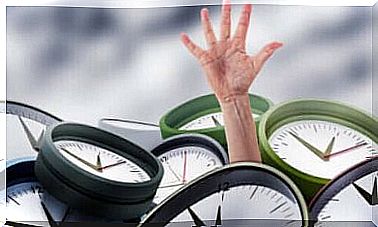What Is Emotional Codependency?

Emotionally codependent relationships are not healthy or balanced. Some can even be poisonous. Therefore, it is important to be aware of the symptoms and correct them as soon as possible. With that in mind, we want to tell you what emotional codependency is, as well as some of its symptoms and how to treat it.
What is Emotional Codependency?
Although the terms are closely related, codependency is not the same as emotional dependence. In the case of dependence, we see individuals whose dysfunctional personality drives them to depend on others to be happy.
These people are capable of entering into relationships that are highly toxic and destructive because they are completely dependent on their partner. In other words, they view their partner as an indispensable part of their lives, a necessary condition, no matter how bad the relationship is. These individuals are therefore not autonomous and usually have low self-esteem.
Emotional codependency on the other hand is different. In this case, we see people who depend on the dependence of others on them.

This type of dysfunctional relationship can occur in any relational context (parents/children, friendships, etc.). However, it is especially common in couples.
In relationships that are dependent and codependent, we are at least talking about individuals who are dependent on each other. However, we are looking at two different dynamics.
On the one hand, dependent individuals do not know how to get by without their partners. On the other hand, those who experience emotional codependency are addicted to having someone else depend on them.
Therefore, it can lead them to care excessively for their partners. As tender as this may sound, their motives are not altruistic, but rather manipulative. Therefore, excessive control, jealousy and manipulation can arise in an unbalanced and toxic relationship. As a result, both sides suffer.
The Symptoms of Emotional Codependency
Low self-esteem
Codependent individuals have low self-esteem, as do their dependent partners. In this case, however, they try to fill this void or imbalance by trying to feel useful to the person they think they need.
Control over the partner

Since their own stability is based on someone else needing them, codependent individuals tend to do everything they can to maintain this dependence.
Therefore, it is normal for them to constantly control their partners, manipulate them and even undermine their self-esteem. By doing this, they ensure that their partners continue to need and depend on them.
In need of approval
Codependent people put a lot of time and effort into being helpful to their partners. Therefore, they can feel really frustrated if they don’t get their way or are not rewarded for their efforts.
The fear that their partners will no longer depend on them increases if they don’t get the thanks they seek. In other words, they start to feel doubtful and insecure.
That’s why they need to hear their partners say how great they are and be recognized for all they do for them. They need to hear how necessary they are in their partner’s life.
Further, if this approval is not there, they may even engage in unhealthy punishment dynamics for their partners to understand that they are essential.
Codependent people feel responsible for the feelings of others

Codependent people also suffer. But the truth is that no one is responsible for another’s feelings. However, emotional codependency makes individuals feel responsible for what their partners feel.
Therefore, they can take over their partner’s feelings and feel really frustrated if they can’t make them happy. Let’s not forget that their goal is to be essential in the lives and well-being of their partners. In this sense, they see any negative feelings in their partners as a potential threat to their dependence.
Obsessed about their partners
These individuals depend on the dependence on others to maintain their self-esteem and fill their void. As a result, they are constantly looking for ways to maintain this dependence and need.
That means they can spend a lot of time thinking of ways to be needed and useful, which can lead to an obsession. In fact , they often forget themselves and neglect their own needs. Their only priority is to prove how necessary they are and make their partners dependent.
The treatment of codependency

A toxic relationship between a dependent and a codependent person needs intervention as soon as possible. In this sense, both parties have to relearn and adjust the way they behave and relate to others .
In addition, they must make a great effort to increase their assertiveness and self-esteem and leave their fears and insecurities behind. They can achieve this through both personalized therapy and couples therapy:
- The first step in the process is recognizing that there is a problem. If a person cannot see the problem, it is impossible to solve it.
- Next, codependent individuals must overcome their fear of being alone. They must also overcome their fear of independence and not being necessary for others. In this sense, they must give up their excessive involvement and concern for changing, controlling and satisfying others.
- In addition, codependent people need to relearn how to be helpful. They need to understand that help and care come from genuine altruism and are not a means of manipulating others to meet their own (often hidden) needs. Helping others should be an act of liberation, not a hidden effort to make others more dependent.
- Normally, people with codependent personalities learn these types of behaviors and attitudes from the time they are children. Therefore, they must begin a process of analysis, self-awareness and correction regarding the wrong lessons they have learned early in life.
- At the same time, both partners must learn to set boundaries, which is a necessary part of any healthy relationship.
Emotional codependency: cConclusion
People with codependent tendencies need to understand that relationships must be based on a bond of freedom and personal choice. Trying to ‘bind’ someone else by making them feel that we are essential to their happiness will only lead to problems.







